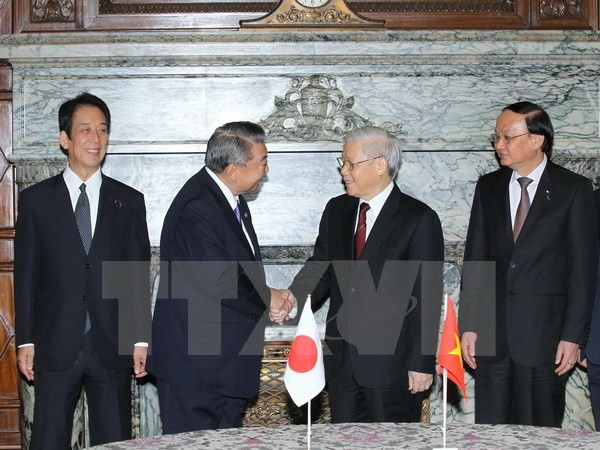 Party General Secreatry Nguyen Phu Trong (second, right) and and Japanese Speaker Tadamori Oshima (second, left) (Photo: VNA)
Party General Secreatry Nguyen Phu Trong (second, right) and and Japanese Speaker Tadamori Oshima (second, left) (Photo: VNA)Stronger links in economic development strategies, production capacity and human resources are key pillars in future economic ties between Vietnam and Japan, stated the joint vision issued during the recent visit to Japan by Party General Secretary Nguyen Phu Trong.
Despite the development gap, Vietnam, a country that has just entered the middle-income group, shares a number of common interests with Japan - the world third largest economy with a per capita income of over 33,000 USD.
Possessing advanced technology and high level of management capacity as well as strong processing, manufacturing, construction and energy industries, Japan is serving as a supporter for Vietnam during its industrialisation and modernisation.
Meanwhile, Vietnam, with its abundant human and natural resources, is also an important strategic partner of Japan.
According to Hitoshi Ogita, Vice Chairman of the Japan Business Federation, the 90-million-strong Vietnamese market is not only a promising place for Japanese firms but also a gateway to the over 600-million-strong growing ASEAN market with total GDP of 2 trillion USD.
Vietnam is considered a strategic destination for Japanese businesses in their development strategy towards the ASEAN Community by the end of this year.
Head of the Party Central Committee’s Economic Commission Vuong Dinh Hue said the two economies can support each other without competition and their connections should start from strategy design and socio-economic development planning.
At the same time, Minister of Transport Dinh La Thang said the economic links between the two countries are visible in transport relationships, such as affiliation in aviation, maritime transport, smart transportation as well as urban traffic management.
Vietnam’s transport infrastructure projects, including the North-South expressway and Long Thanh international airport, have drawn Japanese firms, he held.
In agriculture, Vietnam and Japan will expand cooperation in improving the agricultural product value chain by transferring technology, training personnel and encouraging Japanese firms to invest in the sector.
Vietnamese mango has been available in the Japanese market since September 17 and Vietnam is set to open its market for Japanese apples.
Minister of Agriculture and Rural Development Cao Duc Phat highlighted that Japan will support Vietnam in training personnel and applying advanced technology in agriculture.
Currently, along with currently underway projects, the two sides are working together to launch a series of new ones, he noted, adding that a number of agriculture projects will receive Japanese assistance, including those to adapt with climate change in Mekong Delta Ben Tre province and build fisheries logistics centres in the central province of Khanh Hoa.
Within the Trans-Pacific Partnership cooperation, the two sides are expected to adjust regulations on food safety and quarantine, thus create more favourable conditions for bilateral trade, he said.-VNA





























